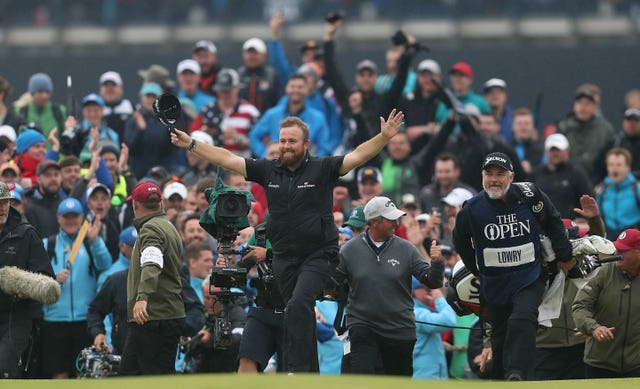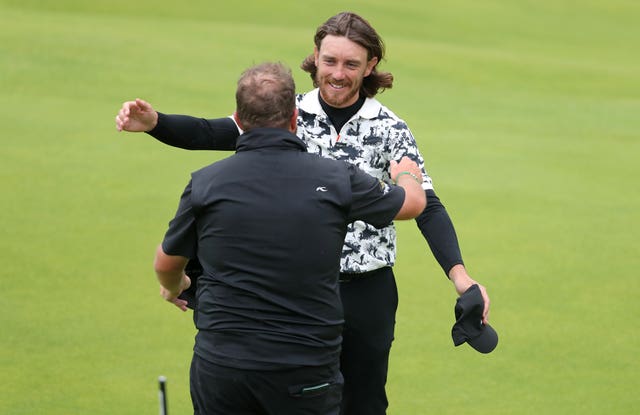A year after being reduced to tears by the state of his game at Carnoustie, Shane Lowry claimed his first major title in commanding fashion in the 148th Open at Royal Portrush.
Roared on by a sell-out crowd undeterred by the miserable conditions, Lowry carded a closing 72 to become the fifth Irish player to lift the Claret Jug after Fred Daly, Padraig Harrington, Darren Clarke and Rory McIlroy.
The 32-year-old from Offaly finished 15 under par, six shots ahead of England's Tommy Fleetwood, with American Tony Finau two strokes further back in third.
Lowry mania 🙌 #TheOpen pic.twitter.com/g3E9oB2kiB
— The Open (@TheOpen) July 21, 2019
World number one Brooks Koepka, who was attempting to become the first player in the modern era to finish in the top two in all four majors in a calendar year, had to settle for a share of fourth with Lee Westwood, a result which secured the 46-year-old a first Masters appearance since 2017 next April.
"I can't believe it. This is not going to sink in for a few days," Lowry said. "Walking down 18 I could not believe this was happening to me. I feel like I am in an out-of-body experience. I was so calm.
"I didn't even know this morning if I was good enough to win a major. The people around me really believed which helped a lot. Times in the past when I was down on myself my coach Neil (Manchip) always said I was going to win one. At least one he said."

One such time Lowry came down on himself was during last year's Open, when he sacked his long-time caddie Dermot Byrne following an opening 74 and went on to miss the cut for the fourth year in succession.
"That just shows how fickle golf is," Lowry added. "I sat in the car park in Carnoustie on the Thursday and I cried. Golf wasn't my friend at the time. It was something that had become very stressful and it was weighing on me and I just didn't like doing it. What a difference a year makes I suppose."
Three years after failing to convert a four-shot lead in the US Open at Oakmont, Lowry took the same advantage into the last day of the first Open staged outside Scotland or England since Max Faulkner triumphed at Portrush in 1951, but almost lost a huge chunk of it on the opening hole.
After a nervous pulled iron shot into the rough and a second shot which found a greenside bunker, Lowry was left with a six-foot putt for a bogey as Fleetwood lined up a birdie attempt from similar range.
Fleetwood missed, Lowry holed and the one-shot difference was soon made up on the third as Fleetwood, who had also missed a good birdie chance on the par-five second, bogeyed the par three.
Lowry extended his lead with a birdie on the fourth and both players birdied the next before Lowry demonstrated the short-game skills honed in chipping competitions against Harrington by getting up and down from short of the seventh green to pick up another shot.

Lowry, who won the 2009 Irish Open as an amateur in similarly poor weather, looked in total control before a combination of three bogeys in the next four holes and Fleetwood's birdie on the 12th cut the gap to four.
However, Fleetwood could not turn the screw and double bogeyed the 14th after finding sand off the tee, meaning Lowry increased his lead to five despite failing to save par from over the green.
Lowry had the title in his grasp and a birdie on the 15th had chants of "Ole, Ole, Ole" ringing out around the Dunluce Links.
Words from The Open Champion 💬@ShaneLowryGolf #TheOpen pic.twitter.com/tL02O5HY0o
— The European Tour (@EuropeanTour) July 21, 2019
It also meant Lowry's name was etched on the Claret Jug by the time he stepped on to the 18th tee and a regulation par sealed an emphatic triumph, Lowry hugging his caddie Brian 'Bo' Martin before being embraced by wife Wendy and two-year-old daughter Iris.
"I talked to Bo a lot today, telling him I can't stop thinking about winning and holding the Claret Jug," Lowry added. "This was after six or seven holes and he was like 'stay with me', he kept talking in my ear.
"I can't wait to wake up tomorrow and what it's going to feel like then. It's going to be incredible."

A downbeat Fleetwood was left to rue those early missed opportunities despite matching his best finish in a major.
"I'm obviously disappointed and a bit low," said the 28-year-old, who was runner-up to Koepka in last year's US Open. "Them first few holes, when you start four back, are pretty crucial. I didn't do a good enough job of pressing at that point."
/https%3A%2F%2Fsportsmole-media-prod.s3.gra.io.cloud.ovh.net%2F19%2F29%2Fshane-lowry_1.jpg)
/https%3A%2F%2Fsportsmole-media-prod.s3.gra.io.cloud.ovh.net%2Fuploads%2F2025%2F07%2Fimago1064308774-687df8278880c158238654.jpg)
/https%3A%2F%2Fsportsmole-media-prod.s3.gra.io.cloud.ovh.net%2Fuploads%2F2025%2F07%2Fimago1064262439-687be8aeadcf5000009884.jpg)
/https%3A%2F%2Fsportsmole-media-prod.s3.gra.io.cloud.ovh.net%2Fuploads%2F2025%2F07%2Fimago1064212389-687aa7dcc0638634105709.jpg)
/https%3A%2F%2Fsportsmole-media-prod.s3.gra.io.cloud.ovh.net%2F25%2F15%2Fxander-schauffele.jpg)
/https%3A%2F%2Fsportsmole-media-prod.s3.gra.io.cloud.ovh.net%2Fuploads%2F2025%2F11%2Fimago1069159340-6919c8e97d457235848029.jpg)
/https%3A%2F%2Fsportsmole-media-prod.s3.gra.io.cloud.ovh.net%2Fuploads%2F2025%2F09%2Fimago1067041272-1-68d9b0bedf85d610051939.jpg)
/https%3A%2F%2Fsportsmole-media-prod.s3.gra.io.cloud.ovh.net%2Fuploads%2F2025%2F09%2Fimago1066949082-68d6b5cf210a1486608871.jpg)
/https%3A%2F%2Fsportsmole-media-prod.s3.gra.io.cloud.ovh.net%2Fuploads%2F2025%2F09%2Fbradley-donald-68d47630b2cec282238824.jpg)